
There are certain milestones in watchmaking that are certainly hard to forget.
For example, the creation of the first men’s modern wristwatch or the timepiece that made it to the moon. There are also other significant moments – among them the introduction of game-changing wrist chronographs.
All these remarkable achievements are forever etched in the history of timekeeping. They continue to serve as constant reminders of the ingenuity and dedication that define watchmakers.
The designs themselves live on too – iconic as they are.
Updated models pay homage to the industry’s innovation, while at the same time act as a testament to the ceaseless pursuit of excellence.
High-Flying Pioneer
With a square case, bezel secured by eight visible screws, and mechanical Swiss movement, the Santos De Cartier is a well-loved timepiece.
That said, the backstory is equally captivating as the design.
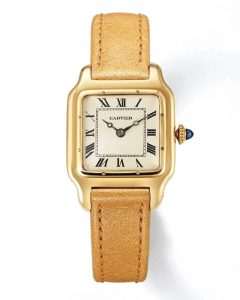
In 1904, Louis Cartier created the first watch specially designed to be worn on the wrist for his friend, aviator Alberto Santos-Dumont. Shown here is an early yellow gold model (circa 1915).
It was in 1904 that Louis Cartier, the grandson of founder Louis-Francois Cartier, created a watch for his pioneering Brazilian aviator friend, Alberto Santos-Dumont.
Named Cartier Santos, the design was deemed as just perfect. Unlike conventional pocket models from that time, it could be read by a pilot while having both hands on the plane’s controls.
The watch has since lived on, with the modern version named Santos De Cartier, together with another model, Cartier Santos Dumont.
With a classic and sleek look, each iteration remains as historically important as it is a masterful creation – even over a hundred years later.
In the 1970s, luxury sports watches witnessed a revival in popularity. Cartier responded to that by updating the classic Santos watch in 1978, giving birth to the Santos De Cartier.
To commemorate its 100th anniversary, a significant collection was released in 2004. Then in 2018, another expansive range was launched – comprising varied looks, plus even skeletonised creations.
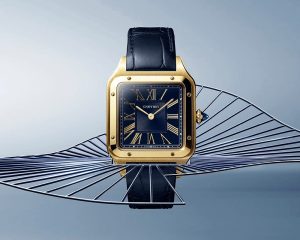
Cartier’s Santos Dumont XL featuring Roman numerals on the dial cut directly into precious stone.
Last year saw the release of three Cartier Santos Dumont models. Each comes in a different precious metal – platinum, rose gold and yellow gold. What they have in common though, are the features: Roman numerals on the dial cut directly in jasper, jade and dumortierite.
A Historic Push
For Breitling, it is the Navitimer that holds a place firmly in the annals of watchmaking milestones.
In 1915, the company developed the first ever wrist-worn chronograph with a pusher separate from the crown. It was also the first model to begin to resemble the modern sports watches of today.
To put into context, the choice of moving the chronograph push-piece out from the crown (located at the three o’clock location) to a more strategic location is significant. It allowed for the chronographic operation of start, stop and reset to be more functional.
While that watch was not the Navitimer, it proved to be an integral part of the Breitling heritage – defined by its strong association with chronographs.
In 1952, in collaboration with the Aircraft Owners and Pilots Association (AOPA), the largest aeronautical association of the time, Breitling launched the development of the Navitimer, which offered what no other watch manufacturer had ever proposed: a chronograph combined with a slide rule for aircraft pilots.
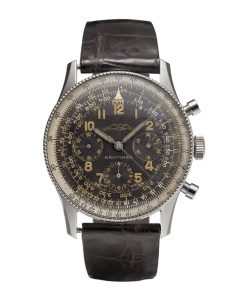
The 1954 Navitimer did not feature the Breitling brand name or logo on the dial.
Initially exclusive to AOPA members in 1954, the Navitimer became accessible to the general public in 1955.
Over the past seven decades, this iconic timepiece has basked in glory – journeyed into space, weathered crises, and seamlessly incorporated numerous advancements, while retaining its original DNA.
The Navitimer has captivated professionals, celebrities and enthusiasts of exceptional watches across generations, firmly establishing itself as an enduring icon.
Last year’s highlights gave everyone something to talk about.
The Navitimer 36 and Navitimer 32 have a more feminine look, with pastel dials, diamond accents, and smaller 36mm and 32mm case sizes.

The more diminutive proportions and feminine aesthetics of the Navitimer 36 and 32 denotes versatility.
Although these models both feature the classic beaded bezel and circular slide rule, they were not chronographs – showing how the Navitimer can evolved to be become more than just sports watches.
One Giant Step…
The moon landing is something that history will never forget – and watchmaking has a part of it.
On July 21, 1969, Edwin “Buzz” Aldrin touched down on the moon. He was one of the three Apollo 11 astronauts and the second person to set foot on the moon’s surface. But more importantly though, on his wrist at that exact moment was an Omega Speedmaster. This is the first watch to have ever been worn on the moon.
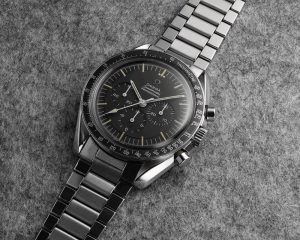
When Buzz Aldrin stepped onto the lunar surface in 1969 this Speedmaster model became the first watch ever worn on the moon.
Since the appearance on Aldrin’s wrist, the watch has gone on to become an unwavering worldwide favourite.
Regular releases have ensured the design stays in everyone’s minds. They also exist in some of the coolest iterations.
Consider last year’s Speedmaster Super Racing. It is a handsome timepiece indeed. Decorations include yellow detailing, a honeycomb dial and the yellow and black striped hand on the small seconds subdial.
The caseback is transparent, showing off the new revolutionary hairspring “tuning” device called the Spirate System.
This system combines a silicon balance spring (which causes the balance wheel to oscillate and turn the wheels that move the hands) with a fine tuning device incorporated into the balance bridge.
Omega’s Spirate System thus allows super-fine adjustments to be made in increments of just 0.01 of a second.
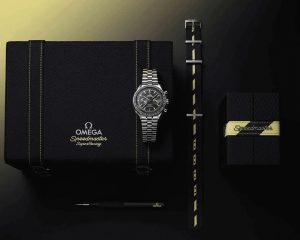
Omega Speedmaster with Spirate System, which improves the accuracy of it as a chronograph.
The update underscores the exact attitude of a milestone design – in this instance, an innovative watch that was once worn on the moon.
Omega also captured a striking portrait of Aldrin for the 54th anniversary last year. In the visual, he wears the Omega Speedmaster 321 (Ref. 311.30.40.30.01.001), a timepiece housing the legendary caliber that powered every Omega Speedmaster worn on lunar missions.
Caliber 321 has accompanied all of them since Apollo 11 to Apollo 17. It has proven its accuracy and reliability, making it a trusted companion for astronauts venturing into space –and beyond…
Discover more brands and collections at Cortina Watch boutiques, or online.












